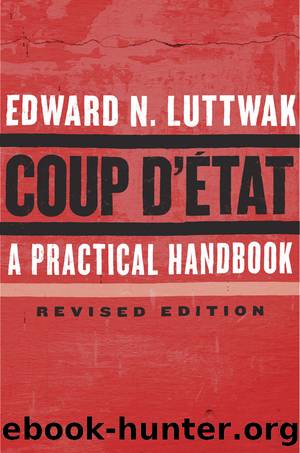Coup D'Ãtat: A Practical Handbook, Revised Edition by Edward Luttwak

Author:Edward Luttwak
Language: eng
Format: azw3, pdf, mobi
Tags: Political Process, History & Theory, Strategy, Political Science, Military, General, History
ISBN: 9780674737266
Publisher: Harvard University Press
Published: 2016-04-11T16:21:24+00:00
Chapter 4
The Planning of the Coup dâÃtat
Even barricades, apparently a mechanical element of the uprising, are of significance in reality above all as a moral force.
âLev Davidovich Bronstein (Leon Trotsky)
In the early morning of April 23, 1961, elements of the First Foreign Legion Parachute Regiment seized the key points of the city of Algiers in the name of Generals Maurice Challe, André Zeller, Edmond Jouhaud, and Raoul Salan. The four generals, because of their personal prestige and their position in the French hierarchy, quickly asserted their control over the local military command and started to extend their authority over all the armed forces in Algeria. At this time, de Gaulleâs government was in the process of opening negotiations with the Algerian nationalists, and the generals were determined to replace him with a leader who would carry the war to a victorious conclusion. The French armed forces in Algeria were much more powerful than those stationed in France and Germany, and the four generals were hopeful that, once their allegiance was assured, they would find it easy to take effective control of the French government. After all, de Gaulle himself had come to power after a similar episode in May 1958, and there seemed to be no major obstacle to a successful second edition of the famous treize mai.
When the four generals made their declaration over Algiers Radio, the First, Fourteenth, and Eighteenth Colonial Parachute regiments rallied to the coup. A few infantry units, some of the marines, and much of the air force remained loyal to de Gaulle (as in May 1958 they had remained loyal to the Fourth Republic), but most of the armed forces in Algeria were attentiste. Wait-and-see is the attitude that usually favors a coup, and when General Henri de Pouilly withdrew his headquarters in Algeria from Oran to Tlemcen to avoid having to choose between fighting or joining the coup, he was objectively favoring the coup.
The four generals seemed to be on the verge of victory. The determined pieds noirs population of Algeria was 100 percent behind them. The powerful parachute units gave them a hard-hitting force of intervention, and the bulk of the armed forces were either for them or neutral. Even the forces loyal to de Gaulleâs government did nothing to actively oppose the coup.
While the leaders of the coup started to gather support, the French Defense Minister was on a visit to Morocco; Maurice Papon, the head of the Paris police, was on vacation; Michel Debré, the prime minister and chief âfirefighterâ of the regime, was ill; and de Gaulle himself was entertaining the visiting president of Senegal, Léopold Sédar Senghor. Other ministers were on visits to Algiers itself, and were promptly captured and held in confinement, together with other representatives of the president. Everything pointed to an early victory of the coup, and, yet, a few days later, General Challe was being flown to Paris for eventual trial and imprisonment, Salan and the others were fleeing to the interior on their
Download
Coup D'Ãtat: A Practical Handbook, Revised Edition by Edward Luttwak.pdf
Coup D'Ãtat: A Practical Handbook, Revised Edition by Edward Luttwak.mobi
This site does not store any files on its server. We only index and link to content provided by other sites. Please contact the content providers to delete copyright contents if any and email us, we'll remove relevant links or contents immediately.
| Arms Control | Diplomacy |
| Security | Trades & Tariffs |
| Treaties | African |
| Asian | Australian & Oceanian |
| Canadian | Caribbean & Latin American |
| European | Middle Eastern |
| Russian & Former Soviet Union |
The Secret History by Donna Tartt(16657)
The Social Justice Warrior Handbook by Lisa De Pasquale(11493)
Thirteen Reasons Why by Jay Asher(7801)
This Is How You Lose Her by Junot Diaz(5797)
Weapons of Math Destruction by Cathy O'Neil(5046)
Zero to One by Peter Thiel(4834)
The Myth of the Strong Leader by Archie Brown(4795)
Promise Me, Dad by Joe Biden(4455)
Beartown by Fredrik Backman(4433)
Stone's Rules by Roger Stone(4422)
How Democracies Die by Steven Levitsky & Daniel Ziblatt(4413)
The Fire Next Time by James Baldwin(4350)
100 Deadly Skills by Clint Emerson(4085)
A Higher Loyalty: Truth, Lies, and Leadership by James Comey(4038)
Rise and Kill First by Ronen Bergman(4020)
The David Icke Guide to the Global Conspiracy (and how to end it) by David Icke(3891)
The Farm by Tom Rob Smith(3878)
Secrecy World by Jake Bernstein(3788)
The Doomsday Machine by Daniel Ellsberg(3737)
